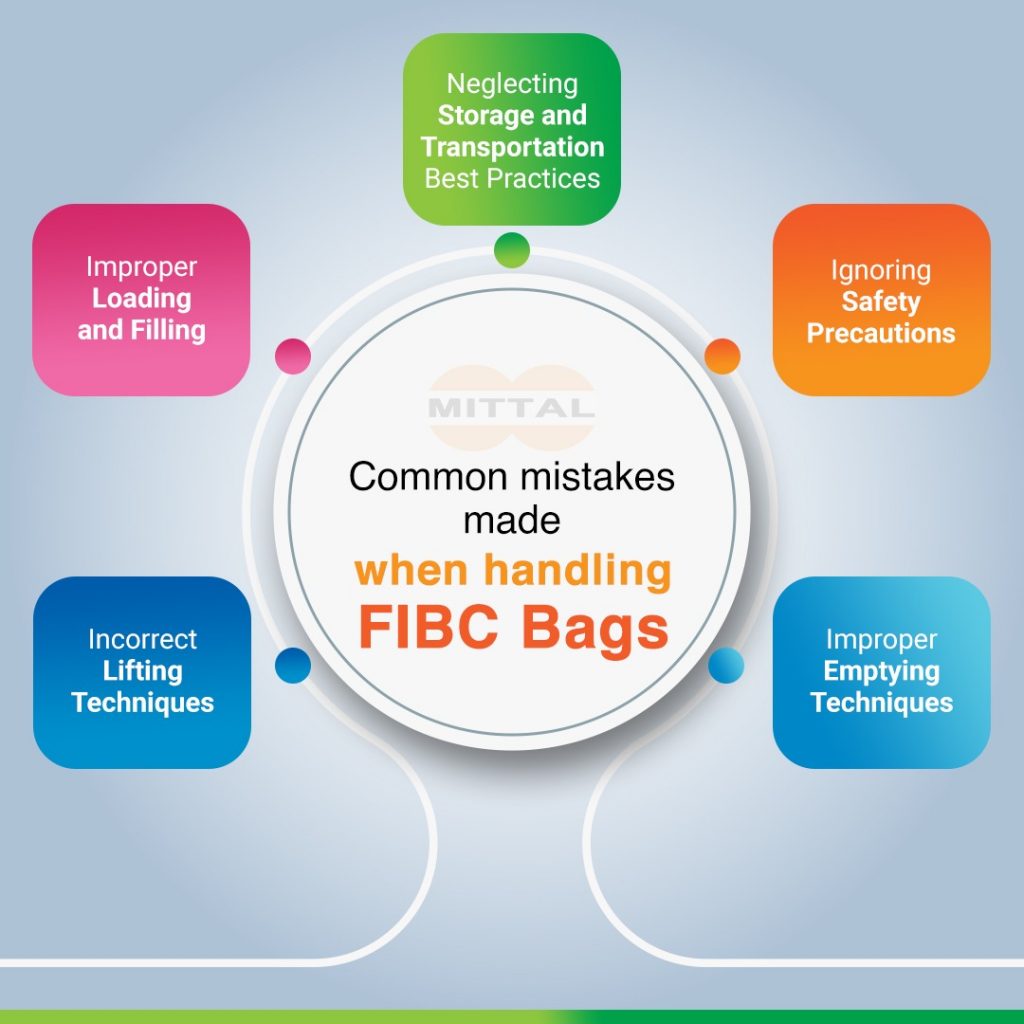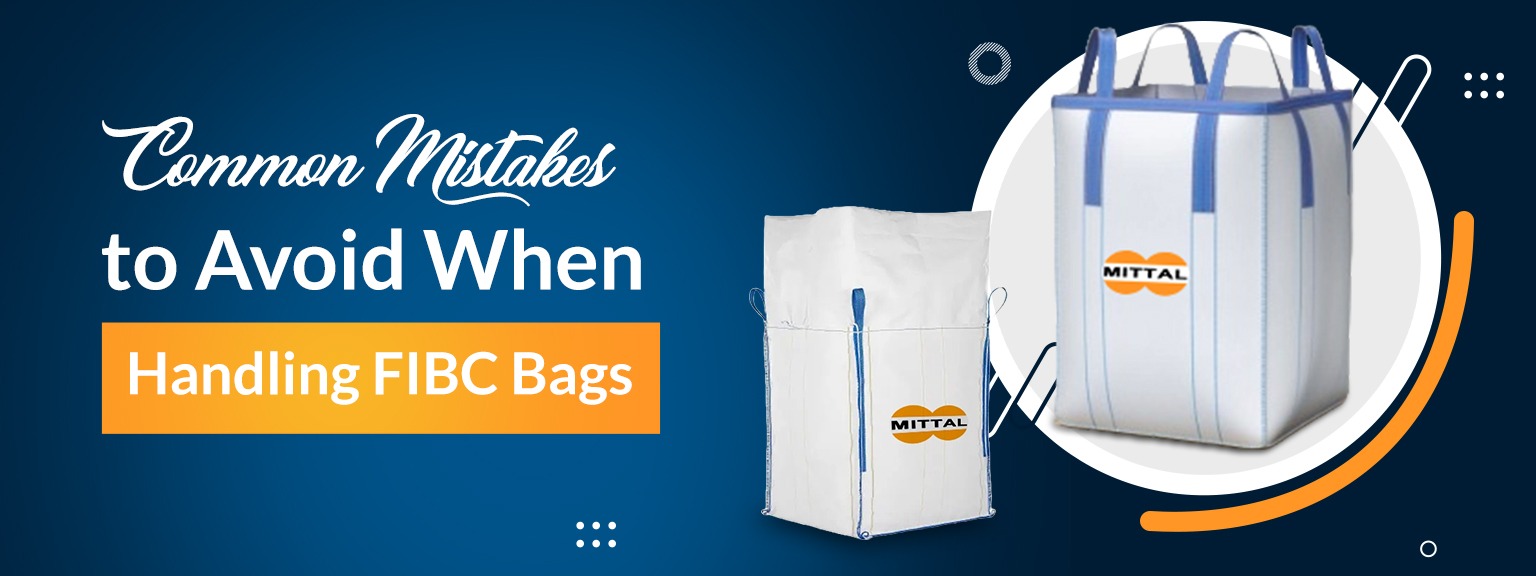FIBC Bags, also referred to as bulk bags or super sacks, have revolutionized the packaging and transportation of large quantities of materials. Their cost-effectiveness, durability, and versatility have made them an essential choice across industries. However, improper handling can undermine their benefits, leading to accidents, product loss, or even injury.
With over 40 years of expertise in producing top-quality FIBC bags at Mittal Technopack Pvt. Ltd., we understand the importance of proper handling to ensure safety and efficiency.
Common mistakes made when handling FIBC Bags

1. Incorrect Lifting Techniques
Lifting FIBC bags improperly is one of the most common causes of accidents. To ensure safety and prevent damage:
- Use All Lifting Loops: These loops are designed to distribute weight evenly. Ignoring them can lead to tears or tipping.
- Inspect Lifting Equipment: Always check forklifts, cranes, or hoists for damage before use. Faulty equipment could fail under load.
- Avoid Lifting with a Single Hook: Unless the bag is specifically designed for single-point lifting, this can lead to imbalances and strain seams.
- Maintain Smooth Movements: Jerky motions—whether lifting, swinging, or dropping—can destabilize the bag, increasing the risk of accidents.
2. Improper Loading and Filling
Filling FIBC bags incorrectly can compromise the bag’s structural integrity and performance. Key mistakes include:
- Overfilling: Always adhere to the specified Safe Working Load (SWL) listed on the bag’s label. Exceeding capacity can overstress seams and fabric.
- Uneven Weight Distribution: Skewed loads result in instability, making transportation unsafe. Fill evenly for a balanced bag.
- Using Non-Approved Products: FIBC bags are tailored for specific materials. Introducing unapproved contents (e.g., chemicals or powders) can lead to contamination or chemical reactions.
3. Neglecting Storage and Transportation Best Practices
Storing and transporting FIBC bags without care can degrade their quality or create hazards:
- Improper Stacking: Avoid stacking bags too high or irregularly as this may lead to collapses. Utilize pallets or racks for additional stability.
- Exposure to Harsh Conditions: Direct sunlight, humidity, or extreme temperatures can weaken the bag’s fabric, reducing its lifespan. Store bags in a cool, dry space.
- Lack of Securing in Transport: During transit, FIBC bags can shift if not secured properly. Use straps, nets, or corner boards to anchor them.
4. Ignoring Safety Precautions
Safety is non-negotiable when handling FIBC bags. Common oversights include:
- Lack of Employee Training: Proper training on lifting, loading, and emergency response minimizes the risk of accidents.
- Failure to Wear Protective Gear: Ensure workers use safety shoes, gloves, and eye protection. Even a minor oversight can lead to injuries.
- Disregarding Warning Labels: Every FIBC bag comes with specific usage instructions and warnings—follow these to avoid mishaps.
5. Improper Emptying Techniques
Emptying an FIBC bag might seem straightforward, but doing it incorrectly can lead to accidents or spills:
- Damaged Bags: Never attempt to empty a damaged bag without consulting the manufacturer for best practices.
- Using Unapproved Equipment: Always use equipment specifically designed for FIBC bags to maintain control and prevent tears or instability.
- Jerky Movements: Rapid movements during emptying may cause spillage or destabilize the bag.
Why Choose Mittal Technopack Pvt. Ltd. for Your FIBC Needs?
With over four decades of expertise and a legacy rooted in quality, Mittal Technopack Pvt. Ltd. is India’s largest manufacturer and exporter of FIBC bags. Here’s why businesses worldwide trust us:
- Certifications That Matter: BRCGS (AA+), ISO9001, ISO22000, HALAL, KOSHER, FSSC22000—demonstrating global compliance.
- Sustainable Solutions: We craft durable and protective FIBC bags in compliance with international quality and safety standards.
- Custom-Made Excellence: Our bags are designed to suit your specific needs, from materials to finishes.
- Recognized Industry Leadership: Accredited as a 2-Star Export House and awarded AEO status by the Government of India.
A Bright Future with Mittal Technopack:
Our enthusiastic team is driven by a desire to exceed horizons and secure the leading edge in packaging solutions. Whether you’re looking for reliable FIBCs for agricultural, chemical, or food-grade materials, we’ve got you covered.
Closing Thoughts
By avoiding common handling mistakes, you can maximize the lifespan and performance of your FIBC bags, ensuring the safety of your workforce and the integrity of your products. At Mittal Technopack, we are committed to providing FIBC bags that exemplify strength, durability, and reliability—qualities that make a real difference in your operations.






















